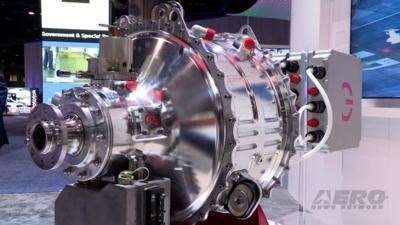Complexities of the Simplest Element
An industry team headed-up by Universal Hydrogen—the California energy concern about the commendable endeavor of making hydrogen-powered commercial flight a near-term reality—is preparing to test a revolutionary aircraft powerplant in the wide-open skies above Eastern Washington State’s Grant County International Airport (MWH).

The aircraft that will serve as the new-fangled powerplant’s testbed is Universal Hydrogen’s own Lightning McClean, a De Havilland Dash 8-300 regional airliner, the right engine of which has been replaced by a hydrogen-electric powertrain comprising Universal Hydrogen’s hydrogen fuel-cells and Everett, Washington-based MagniX’s Magni650 electric propulsion unit. The Dash 8’s left engine remains the OEM 2,380-shaft-horsepower Pratt & Whitney PW123 turboprop mill—the proven reliability of which offsets the hydrogen-electric architecture’s unknowns and affords safety-critical redundancy.
Universal Hydrogen chief technology officer Mark Cousin remarked: “In the case of failure of the hydrogen engine, we can return to land safely with the existing Pratt & Whitney engine.”
Universal Hydrogen announced in early January 2023 that it had spun up the propeller of Lightning McClean’s MagniX-built, hydrogen fuel-cell-powered electric motor for the first time. Comes now late January, and the aircraft is ready to commence ground testing in earnest.
“We’ll run the powertrain on the ground with the aircraft static … up to maximum power,” Mr. Cousin explained. “Once we’re happy with the behavior of the system, we will then move into taxi testing and the buildup to flight.”
Universal Hydrogen’s strategy calls for the use of modularized capsules initially containing compressed gas and eventually containing super-cooled liquid hydrogen. Modularity, in the company’s estimation, mitigates the risk of leakage during aircraft fueling operations.
Hydrogen’s appeal as a zero-emission fuel derives largely of the fact it reacts with oxygen in a fuel cell to create electricity, producing only water as a byproduct.
British/American hydrogen-electric aircraft developer ZeroAvia announced on 19 January 2023 that it had successfully flown a 19-seat Dornier 228 testbed aircraft, the left-engine of which had been replaced with a full-size prototype of the company’s hydrogen-electric powertrain.

Mr. Cousin set forth that he doesn’t consider ZeroAvia a Universal Hydrogen competitor, pointing out that ZeroAvia is working on a hybrid hydrogen-battery propulsion system, while Universal Hydrogen is committed wholly and exclusively to hydrogen power. What’s more, Universal Hydrogen’s main focus is on the fuel supply chain rather than aircraft alone. Cousin compared his company to the Nespresso coffee enterprise, which sells its coffee-makers at cost but derives the bulk of its profit from selling the coffee pods by which the machines are rendered useful.
Initially, Universal Hydrogen intends to offer hydrogen-electric propulsion system conversions for the 78-passenger, French-built ATR-72 twin-engine turboprop regional airliner. Mr. Cousin stated: “Our current target is to have what’s called a supplemental type certificate, which is a certificate which allows the modification of an existing airplane. Our target is to have that ready and certified by the end of 2025.”
To date, Universal Hydrogen has struck ATR-72 conversion deals with numerous customers. The company’s aspirations are further-reaching, however. “We’ll make a business out of converting ATR-72s,” Mr. Cousin concluded. “It’s a good business. But the real aim is to demonstrate to the flying public, the airlines, and the customers of Airbus and Boeing that flying aircraft on hydrogen—particularly with this modular solution that we have for getting that hydrogen to the aircraft and loaded onto the aircraft—is a viable solution for that next generation of single-aisle aircraft.”
 ANN's Daily Aero-Linx (04.16.24)
ANN's Daily Aero-Linx (04.16.24) Aero-News: Quote of the Day (04.16.24)
Aero-News: Quote of the Day (04.16.24) Airborne 04.10.24: SnF24!, A50 Heritage Reveal, HeliCycle!, Montaer MC-01
Airborne 04.10.24: SnF24!, A50 Heritage Reveal, HeliCycle!, Montaer MC-01 Airborne 04.12.24: SnF24!, G100UL Is Here, Holy Micro, Plane Tags
Airborne 04.12.24: SnF24!, G100UL Is Here, Holy Micro, Plane Tags Airborne-Flight Training 04.17.24: Feds Need Controllers, Spirit Delay, Redbird
Airborne-Flight Training 04.17.24: Feds Need Controllers, Spirit Delay, Redbird




